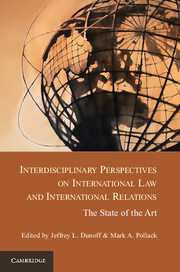 Interdisciplinary Perspectives on International Law and International Relations
Interdisciplinary Perspectives on International Law and International Relations Published online by Cambridge University Press: 05 January 2013
The form and substance of international agreements are intimately linked. This insight, recently articulated by scholars working at the intersection of international law (IL) and international relations (IR) (Guzman 2005; Hathaway 2005; Raustiala 2005), has important implications for the study of legalized interstate cooperation. The relationship between form and substance affects issues central to the international legal system, including treaty design, the choice between hard and soft law, delegation of authority to international organizations and tribunals, and treaty compliance. The form and substance equation is, in turn, shaped by the many uncertainties that pervade international affairs, including insufficient information about future events, the preferences of other states, and shifts in domestic politics (Koremenos, Lipson, and Snidal 2001).
The linkage between form and substance also illuminates the choices and constraints that governments face, both when they negotiate international agreements and when they decide whether to comply with those agreements over time. Consider as a preliminary example a country that favors the adoption of a “deep” multilateral agreement that requires extensive changes to existing behavior. The state can pursue a range of different strategies to achieve its goal. It may limit participation to a smaller number of countries with similar preferences that will accept the treaty's onerous requirements. Or, it may broaden participation by offering incentives or concessions to nations reluctant to ratify the agreement. These inducements can take many forms, such as side payments, technical assistance, and other treaty membership benefits. But they can also include flexibility mechanisms that make the treaty more attractive by authorizing the parties to manage the risks of joining the agreement. These provisions function as insurance policies. They provide a hedge against uncertainty that allows a state to revise, readjust, or even renounce its commitments if the anticipated benefits of treaty-based cooperation turn out to be overblown (Bilder 1981; Sykes 1991; Helfer 2005).
To save this book to your Kindle, first ensure [email protected] is added to your Approved Personal Document E-mail List under your Personal Document Settings on the Manage Your Content and Devices page of your Amazon account. Then enter the ‘name’ part of your Kindle email address below. Find out more about saving to your Kindle.
Note you can select to save to either the @free.kindle.com or @kindle.com variations. ‘@free.kindle.com’ emails are free but can only be saved to your device when it is connected to wi-fi. ‘@kindle.com’ emails can be delivered even when you are not connected to wi-fi, but note that service fees apply.
Find out more about the Kindle Personal Document Service.
To save content items to your account, please confirm that you agree to abide by our usage policies. If this is the first time you use this feature, you will be asked to authorise Cambridge Core to connect with your account. Find out more about saving content to Dropbox.
To save content items to your account, please confirm that you agree to abide by our usage policies. If this is the first time you use this feature, you will be asked to authorise Cambridge Core to connect with your account. Find out more about saving content to Google Drive.